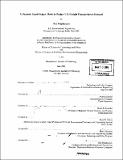A dynamic input-output model to project U.S. freight transportation demand
Author(s)
Voigtlaender, Nico, 1977-
DownloadFull printable version (8.376Mb)
Alternative title
Dynamic I-O model to project United States freight transportation demand
Other Contributors
Massachusetts Institute of Technology. Dept. of Civil and Environmental Engineering.
Advisor
Andreas Schafer and Karen R. Polenske.
Terms of use
Metadata
Show full item recordAbstract
Understanding and modeling U.S. freight transportation demand is essential for infrastructure planning, the development of transportation-related regulatory frameworks, and the assessment of environmental implications. However, existing models that forecast U.S. freight transportation demand are very complicated and require a vast computational effort. In the following, I develop a simpler, yet more effective, model to project economic performance and the resulting freight transportation demand. I analyze and project economic growth and structural change using an input-output framework. This economic part of my model projects U.S. commodity output values for the next two decades. In the second part of my model, commodity values are transformed into quantities of freight transportation demand. The latter are the basis for deriving environmental implications of growing freight shipment activities. In the analysis of model outputs, I examine a significant trend towards relatively light, high-value commodities, which reflects ongoing dematerialization in the U.S. economy. Nevertheless, these commodities promote a shift towards faster, more energy-intensive freight transport modes, which gives reason for environmental concern and requires regulatory action to support less carbon-intensive freight transportation.
Description
Thesis (S.M.)--Massachusetts Institute of Technology, Engineering Systems Division, Technology and Policy Program; and, (S.M.)--Massachusetts Institute of Technology, Dept. of Civil and Environmental Engineering, 2002. Includes bibliographical references (p. 159-161).
Date issued
2002Department
Massachusetts Institute of Technology. Department of Civil and Environmental Engineering; Massachusetts Institute of Technology. Engineering Systems Division; Technology and Policy ProgramPublisher
Massachusetts Institute of Technology
Keywords
Technology and Policy Program., Civil and Environmental Engineering.